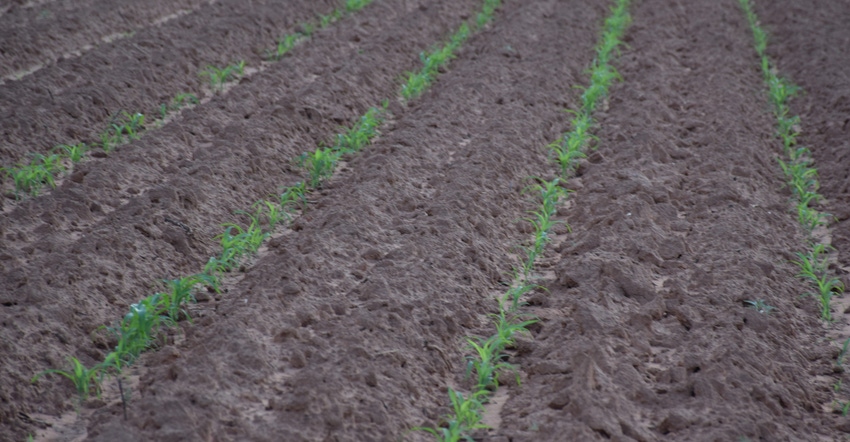
For more than a decade, better technology to manage grassy weeds has been near the top of the wish list for sorghum growers.
The desire to fund research into herbicide-tolerant hybrids and companion herbicides for them was one of the drivers behind the establishment of the sorghum checkoff in 2008. Control of grassy weeds, especially postemergence was a top objective of the sorghum checkoff strategic plan in 2015.
In 2020, it looks as though the industry’s efforts are paying off with three new technologies set to be potentially available in at least limited quantities of seed for farmers to plant in the 2021 growing season. Three competitive seed researchers are debuting the herbicide-tolerance products, which offer three different tolerance traits and herbicide packages. None are GMOs.
“For producers, we are seeing a lot of good things in farmers having choices about which program will work better for them,” says Brent Bean, director of agronomy at the United Sorghum Checkoff Program. “The checkoff is funding research to test the different herbicides and see what works best for different grasses. We are hopeful that having these technologies will expand the acres of sorghum being planted as well as increase overall sorghum profitability.”
Moving forward, Bean says, more information will be coming out about each of the programs.
“We’ll know a lot more by next spring,” he says.
First effort hit roadblock
The first herbicide-tolerance technology that appeared to be available to sorghum growers as acetolactate synthase (ALS) tolerance discovered in shattercane by researchers at Kansas State University. This technology was patented and later sold to DuPont Crop Protection and named Inzen.
The companion herbicide, Zest, a DuPont product, received U.S. EPA approval in 2015 followed by Canadian Plant Novel Technology approved in February of 2016 and Alta Seeds ad DuPont Crop Protection began field trials on hybrids with the Inzen herbicide tolerance technology.
There were problems, however, namely deficiencies in hybrid seed production that led to higher than expected production costs that would have a big impact on the cost of seed sold to sorghum growers.
“It was going to cost significantly more money than we had anticipated,” says Ben Beyer, Advanta Seeds USA Sorghum Breeding Lead. “About the same time, we had discovered a mutation in grain sorghum in one of our proprietary lines in Argentina that offered tolerance to imidazolinone herbicides.”
Focus on igrowth
That led Advanta to shift gears and focus more work on developing their patented and proprietary IMI herbicide tolerance named the igrowth. That program is now in the final steps for commercial launch in the U.S. The companion herbicide, Imaflex, will be sold by UPL and is expected to gain EPA approval by the end of the year.
Igrowth technology was first launched in 2018 in Australia and Argentina and is also now available in Uruguay, Paraguay and Bolivia.
Beyer says the igrowth program offers the advantage of providing control of summer grasses and also some broadleaf weeds in a preemergence or over-the-top application if registration goes as expected.
Igrowth technology will be available in five Alta Seed hybrids, Beyer says.
Preorders of the 2021 grain sorghum hybrids will be available beginning at igrowth's Sorghum Frontier field days, which will be hosted virtually July 8. Additional virtual field days will be held Aug. 18 from Enid, Okla., and Sept. 2 from Larned, Kan. Growers can also visit with their local igrowth retailer or go online to complete a preorder application.
What about Inzen?
The companion herbicide for the Inzen trait, Zest, was passed to Corteva when it spun off from Dow-Dupont. Bean says it is his understanding that Corteva is continuing to work on the development of the Inzen trait and plans to introduce Inzen sorghum hybrids, possibly as early as 2021.
Corteva, which was spun off a year ago after the merger of Dow and DuPont, inherited the prior work done by DuPont on the Inzen trait as well as rights to Zest herbicide.
“We’ve been working to bring the yields consistently up to a level that we felt we could commercialize,” says LeAnn Larson, marketing manager for sorghum with Corteva.
Corteva is now in Phase 4 of a prelaunch and expects to officially launch the trait for planting in 2021.
Larsen says Corteva has the advantage of having both the seed and the chemistry pieces in-house, as well as already having the necessary regulatory approvals for Zest.
S&W Seed and Adama program
Meanwhile, S&W Seed, a global agricultural company with a leading position in sorghum through its Sorghum Partners brand, and Adama, one of the world’s leading crop protection companies, have announced new herbicide-tolerant traits developed using its advanced research and technology platform.
The program, called Double Team, offers ACCase tolerance. S&W developed the new Double Team ACCase tolerance trait in collaboration with the United Sorghum Checkoff Program using traditional breeding non-GMO tissue culture.
Adama will supply a proprietary formulation technology for effective weed control. The herbicide, to be branded First Act, has been tested and proven to maintain high levels of crop safety while controlling a broad range of grassy weeds and is easy to handle based on formulation efforts. It is expected to receive EPA registration later this year.
“Historically, sorghum has lagged behind other major crops like corn, soybeans, and cotton in the application of novel technologies,” says Don Panter, executive vice president at S&W. “However, we look at sorghum as one of our key product lines and have prioritized our R&D efforts to bring this traditional breeding, non-GMO technology to U.S. sorghum growers in what we believe is record time.
“We plan to bring a broad spectrum of Double Team sorghum hybrids to the marketplace through our Sorghum Partners brand, and by offering top-tier seed companies licenses to the Double Team system. We are very pleased to have an experienced global partner like Adama developing weed control systems and supporting stewardship and grower education.”
Extensive field trials are planned for 2020 to verify further hybrid performance and crop selectivity. This round of field trials will help to fine-tune the use of the Double Team sorghum cropping weed control system. Regulatory trials are also underway to obtain global approval for the trait and herbicide to facilitate grain export.
Education is important
Bean says that while having three new herbicide-tolerant programs is exciting, it also comes with a major challenge to make sure growers are educated about all the products and how to use them to protect them from resistance development.
“Stewardship education is going to be really important,” he says. “And we will be working hard, as I am sure all three companies will also, to make sure that growers are using these technologies in a way to maximize their effectiveness and long-term viability.”
About the Author(s)
You May Also Like






